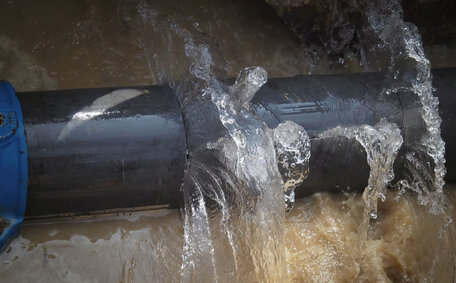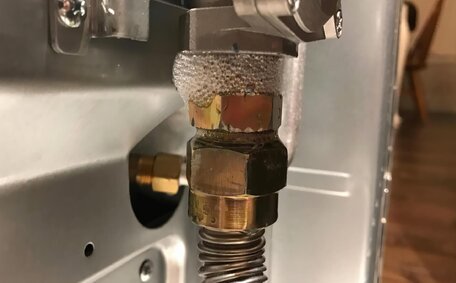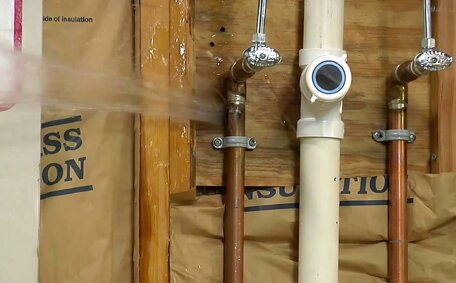Understanding Blocked Drains: Common Causes and Resulting Damage
Blocked drains are a common plumbing issue that can lead to water damage if left untreated. Debris buildup, grease, tree roots, and pipe damage are some of the top causes of drain blockages. As roots seek water sources, they cause blocked and clogged drains over time.
Recognising early signs of a blocked drain, like gurgling sounds, slow drainage, bad smells, and water pooling, is crucial to protect your property. Partial obstructions, such as debris getting into your gutters, may evolve into blockages that stop water from draining through sewer lines and may ultimately affect the entire system your home relies on.
Backups put pressure on your water system’s pipes, leading to bursts and leaks that can damage walls, floors, and foundations. The resulting water damage from issues with your hot water system encourages mould growth and can significantly damage your property. Tree root infiltration can also crack drain pipes, potentially leading to issues that damage your home.
When it comes to ensuring protection, it’s critical to break down clogged drains professionally as soon as you notice signs of trouble. Your plumber can determine the cause and location of the blockage using a drain camera, ensuring an accurate diagnosis. They can remove the obstruction and repair the damage to ensure your plumbing operates smoothly.
Key Factors That Determine Home Insurance Coverage
Several key factors influence whether damage from blocked drains is included in your homeowner’s insurance policy:
Sudden and Accidental Damage
Most homeowners insurance cover includes protection for blocked drains when it’s sudden and accidental, such as pipe bursts that cause water leaks. Gradual deterioration, accentuating wear and tear, often isn’t covered by insurance. If the blocked drain was unexpected, insurance may pay for resulting water damage repairs—but remember to read the fine print in your policy.
Cause of Blockage
Insurance policies usually cover drainage issues from sudden events like pipe collapses, but not those due to slow debris accumulation or root growth. Figuring out the cause blocked drain aids in assessing if it counts as accidental damage within your coverage.
Policy Exclusions
Even with accidental pipe bursts, always check your policies for exclusions, as in some cases, additional damages might not be covered under your insurance cover. For example, some insurance policies don’t cover wear and tear or corrosion from ageing pipes. Check if your policy has exclusions for underground pipes, then clarify specifics with your insurer when filing a claim.
Preventative Measures
Preventative measures like installing gutter guards protect your pipes from external debris and help prevent blockages. Have a conversation with your insurance company if you have questions about whether prevention discounts or more comprehensive coverage limits apply for regular proactive plumbing maintenance.
Sudden Blockages vs Gradual Deterioration: What’s Typically Covered
When it comes to insurance coverage for blocked drains, a key distinction is made between sudden blockages caused by abrupt events versus gradual deterioration from lack of maintenance.
Sudden drain obstructions resulting from unanticipated incidents like a hot water system failure, roots abruptly infiltrating pipes, or foreign objects falling into the drain are more likely to be covered by home insurance cover.
This category of accidental damage is generally exactly what your insurance policy covers under its terms. If damage is traceable to a specific, unforeseen incident as opposed to gradual wear, you should file a claim since insurers usually cover subsequent repairs and water damage.
Alternatively, what companies cover often excludes gradual drain blockages from basic coverage, which are caused by an accumulation of hair, soap residue, or the slow corrosion of pipes. Insurance companies may deny claims for certain types damage if the clog developed gradually through regular usage instead of a sudden occurrence.
The reasoning is that homeowners are tasked with taking care of routine maintenance such as drain cleaning, managing ageing pipe repairs, and clog prevention. Insurers advocate for regular plumbing maintenance to prevent expenses that might come out of your pocket later.
When Backup Damage Is Covered by Insurance
Backup damage can often be covered if it meets certain criteria in your home insurance policy:
Sudden and Accidental Backups
House insurance generally covers damage from sudden and accidental drain backups. Your insurance may cover unexpected sewage backups and associated house damage if caused by collapses, clogs, or pipe bursts.
Resulting Property Damage
Backup damage impacting floors, walls, and furniture, which might include a contents insurance claim, is often covered, depending on your policy limits and deductible. Make sure to document and photograph all losses for your insurance company claims.
Key Exclusions
Gradual accumulation of debris leading to backups often categorised as cover cost exclusions typically fall under wear and tear. Damage from floods, ground movement or faulty home construction may have special exclusions as well. Consult your insurance firm to understand what they actually cover and analyse the cause.
Knowing your policy’s coverage on sudden drain backups is essential for protection against unexpected incidents. Connect with an agent to find out and ensure you have adequate protection.
Exclusions to Be Aware Of: Maintenance Issues and Wear and Tear
Standard home insurance policies often exclude coverage for damage resulting from inadequate maintenance or ongoing wear and tear. These types of issues are usually considered the homeowner’s responsibility.
If seasonal temperature changes repeatedly cause pipes to burst in your home but you haven’t properly insulated them, your insurer may deny a claim for the resulting water damage. They would argue that regular maintenance like sorting out your pipes could have prevented the leaks.
In the same way, insurers typically don’t cover repairs for drain blockages due to slow buildup of debris, mineral deposits or roots growing over many years. The rationale is that occasional drain cleaning and treatment could avoid the gradual clogging. Allowing deteriorated pipes to clog shows neglect.
Make sure you understand exclusions in your individual home insurance policy related to maintenance and wear and tear issues covered by insurance providers. Address any questions and ensure you know what the product disclosure statement details about coverage with your insurance provider when starting or updating your policy. Performing consistent plumbing care allows you to demonstrate responsible property management should you need to file your claim.
Endorsements for Added Sewer and Drain Protection
Homeowners and renters can get additional endorsements or add-ons to expand their insurance coverage for sewer, drain and pipe issues.
Endorsements provide extra protection, including for plumbing accidents not covered by standard policies. They provide coverage for repairs that might be excluded by insurance due to neglect or wear and tear.
Typical endorsements include sewer line and sump pump overflow coverage. These endorsements can save considerable costs by covering issues like municipal sewer line collapses, which may not be included in standard home insurance.
Discuss endorsements when you contact your insurance agent to establish peace of mind, prepared for any potential covered loss with the right coverage and limits. Compare options to choose additional protection that fits your budget and risk tolerance for plumbing mishaps.
Securing appropriate endorsements provides assurance that significant sewer repair costs from unforeseen events will be covered by your insurer.
Tips to Prevent Uncovered Drain Issues
You can help prevent drain problems not covered by insurance with regular plumbing care:
- Inspect pipes annually for leaks or damage that require replacement
- Install gutter guards on your roof to keep debris out of drains
- Clear your drains twice yearly to limit gradual buildup
- Treat tree roots with foam herbicides before they can cause any issues
- Ensure bathroom ventilation to reduce moisture and mildew risks
- Replace them because corrosion-prone galvanised pipes can weaken over time
- Hire professionals to upgrade outdated drain systems
- Discuss maintenance discounts with insurers for proactive pipe servicing
Regular plumbing maintenance not only offers peace of mind but also shows responsibility, which is beneficial in the event of insured damage. Preventative care also minimises unwanted out-of-pocket drain repairs not covered under standard policies.
Why Timely Detection and Repair Are Key
Early detection and prompt resolution of blockages are essential to prevent extensive damage that may not be covered by insurance.
Keep an eye out for common signs of potential clogs like gurgling noises, which might indicate issues covered under your insurance, abundant suds in sinks or tubs, and slow drainage. Periodically inspect your plumbing system, checking for pipe leaks, cracks, or root intrusion. If you spot any warning signs, have a plumber inspect and clear the drain before they escalate into substantial insurance-covered claims.
Likewise, at the first sign of water damage from a burst pipe, act swiftly to cover damage and stop the flooding source and mitigate destruction. Document the damage immediately while preparing your insurance claim and contacting insurers about policy coverage. Respond urgently as delays risk further deterioration insurance may not cover.
Staying vigilant through regular plumbing maintenance and rapid response when trouble arises demonstrates responsibility. It also limits preventable damage caused by small issues being neglected until they become expensive insurance claims.
When to Call a Professional Plumber
For complex plumbing issues beyond DIY repair, we recommend consulting a professional who can swiftly address the problem. Randwick Plumbing can provide 24/7 emergency services for any plumbing problem, such as burst pipes or blocked drain backups causing property damage.
For plumbing concerns such as slow drains or signs of root infiltration, schedule routine services to address them early; our team offers knowledgeable and efficient assistance. Our plumbing services include skilled plumbers who manage drain cleaning, pipe repairs, and comprehensive maintenance for all your plumbing requirements.
Investing in measures like installing gutter guards or replacing old piping requires the expertise of professionals. We help homeowners protect their property and avoid unnecessary insurance claims. Discuss maintenance packages or plumbing inspections to ensure your pipes stay in peak condition.
Don’t hesitate to email or call 1300 349 338 whenever you have concerns about your Randwick property’s plumbing and drainage systems. We’re here to help.






